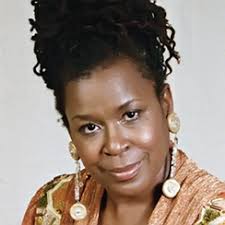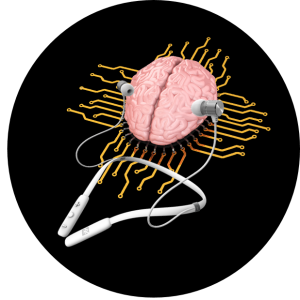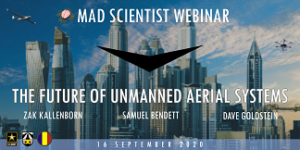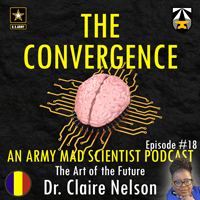[Editor’s Note: Mad Scientist Laboratory is pleased to announce our latest episode of “The Convergence” podcast, featuring Dr. Claire Nelson, futurist, engineer, and activist, discussing a smart futures approach to forecasting, technologies and science in small island nations, and positive impacts on the future. Please note that this podcast and several of the embedded links below are best accessed via a non-DoD network due to network priorities for teleworking — Enjoy!]
 In this latest episode of “The Convergence,” we talk with Dr. Claire Nelson, the Founder and President of the Institute of Caribbean Studies (ICS). Per Forbes, Dr. Nelson “is a strategic thinker, change agent, keynote speaker and innovator,” and is listed among that publication’s 50 Leading Female Futurists. Dr. Nelson is also Ideation Leader of The Futures Forum and Sagient Futures LLC, which provides strategic foresight and development futures consulting. She is a member of the Editorial Advisory Board of the World Futures Review and The Journal of Futures Studies, and is an emerging voice as a Black Futurist.
In this latest episode of “The Convergence,” we talk with Dr. Claire Nelson, the Founder and President of the Institute of Caribbean Studies (ICS). Per Forbes, Dr. Nelson “is a strategic thinker, change agent, keynote speaker and innovator,” and is listed among that publication’s 50 Leading Female Futurists. Dr. Nelson is also Ideation Leader of The Futures Forum and Sagient Futures LLC, which provides strategic foresight and development futures consulting. She is a member of the Editorial Advisory Board of the World Futures Review and The Journal of Futures Studies, and is an emerging voice as a Black Futurist.
In today’s podcast, Dr. Nelson discusses a smart futures approach to forecasting, technologies and science in small island nations, and positive impacts on the future:
-
-
- Everything is a system. National challenges can be viewed from a systems approach by breaking them down to the sum of the parts and then adding them back up. You have to pick the right tool for the problem you are trying to solve.
-
-
-
- Future technology is often presented as utopian. But we need to filter that idea through the smart futures lens. What happens when the technology fails, is compromised, or hacked? There must be forethought about the legal and ethical systems and processes. All of these aspects must be part of the framework.
-
-
-
- Our brains oftentimes can’t negotiate many and varying opposing forces as mathematical equations. But if we translate engineering and mathematical concepts into a story, our minds can more readily assimilate, accept, and understand these complex concepts. Similarly, if we break complex and interconnected systems of systems down into characters in a story, we’re better able to connect with them and solve their related and intricate problems.
-
-
-
- We shouldn’t blindly gather metrics for metrics’ sake. Metrics should specifically address the nature of the problems we’re trying to solve and should be tailored to the specific system that they’re measuring. The language of the transportation system will be different from the language of the military system, and they don’t necessarily cross over or translate proportionally.
-
-
-
- Space is humanity’s common heritage, but there are very few concrete laws and policies in place. Access and awareness will be paramount to the future of sustainable development. Smaller and island nations will need to access this domain to monitor climate change, forecast weather, manage disasters, and ensure food and water security.
-
-
-
- Small island nations can serve as a laboratory or testbed for pilot projects to showcase efficient resource and infrastructure management. With indigenous populations and significant bio-diversity, small island nations offer considerable untapped knowledge, such as thousands of years of seafaring experience from Pacific island nations or access to unique flora and fauna for pharmaceutical research.
-

Stay tuned to the Mad Scientist Laboratory for our next podcast with Dr. Aleksandra Nesic, co-founder of Valka-Mir and Visiting Faculty for both the Countering Violent Extremism and Countering Terrorism Fellowship Program at the Joint Special Operations University (JSOU), USSOCOM, and the U.S. Army JFK Special Warfare Center and School, on 17 Sep 2020!
If you enjoyed this post, check out these related ones:
Ethics, Morals, and Legal Implications
Envisioning Future Operational Environment Possibilities through Story Telling
Space: Challenges and Opportunities
Innovation Isn’t Enough: How Creativity Enables Disruptive Strategic Thinking by Heather Venable
Making the Future More Personal: The Oft-Forgotten Human Driver in Future’s Analysis, by Ian Sullivan
>>> REMINDER: The Mad Scientist Initiative will facilitate our next webinar on Wednesday, 16 September 2020 (1100-1200 EDT):
 The Future of Unmanned Aerial Systems – featuring proclaimed Mad Scientist Mr. Sam Bendett, Advisor, CNA; Mr. Zak Kallenborn, Senior Consultant, ABS Group; and Mr. David Goldstein, Acting Branch Chief for the Precision Targeting & Integration Branch and a Counter- UAS Team Lead, Army Futures Command, Combat Capabilities Development Command, Armaments Center (AFC-CCDC-AC).
The Future of Unmanned Aerial Systems – featuring proclaimed Mad Scientist Mr. Sam Bendett, Advisor, CNA; Mr. Zak Kallenborn, Senior Consultant, ABS Group; and Mr. David Goldstein, Acting Branch Chief for the Precision Targeting & Integration Branch and a Counter- UAS Team Lead, Army Futures Command, Combat Capabilities Development Command, Armaments Center (AFC-CCDC-AC).
In order to participate in this virtual event, you must first register here [via a non-DoD network].




Want to thank Dr. Nelson for making the point “But if we translate engineering and mathematical concepts into a story, our minds can more readily assimilate, accept, and understand these complex concepts.” This truism could result in not just understanding but far more acceptance of science as an enterprise and in specific disciplines. Really appreciate this fact of psychology being stated in this public forum.